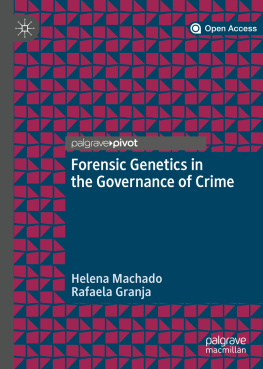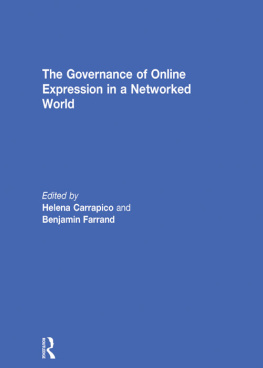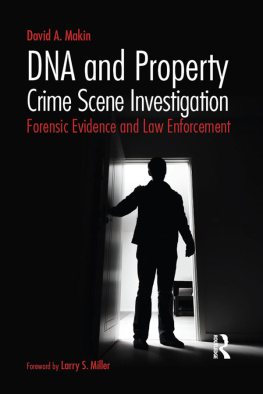Helena Machado - Forensic Genetics in the Governance of Crime
Here you can read online Helena Machado - Forensic Genetics in the Governance of Crime full text of the book (entire story) in english for free. Download pdf and epub, get meaning, cover and reviews about this ebook. year: 2020, publisher: Springer Singapore, genre: Politics. Description of the work, (preface) as well as reviews are available. Best literature library LitArk.com created for fans of good reading and offers a wide selection of genres:
Romance novel
Science fiction
Adventure
Detective
Science
History
Home and family
Prose
Art
Politics
Computer
Non-fiction
Religion
Business
Children
Humor
Choose a favorite category and find really read worthwhile books. Enjoy immersion in the world of imagination, feel the emotions of the characters or learn something new for yourself, make an fascinating discovery.
- Book:Forensic Genetics in the Governance of Crime
- Author:
- Publisher:Springer Singapore
- Genre:
- Year:2020
- Rating:4 / 5
- Favourites:Add to favourites
- Your mark:
- 80
- 1
- 2
- 3
- 4
- 5
Forensic Genetics in the Governance of Crime: summary, description and annotation
We offer to read an annotation, description, summary or preface (depends on what the author of the book "Forensic Genetics in the Governance of Crime" wrote himself). If you haven't found the necessary information about the book — write in the comments, we will try to find it.
Forensic Genetics in the Governance of Crime — read online for free the complete book (whole text) full work
Below is the text of the book, divided by pages. System saving the place of the last page read, allows you to conveniently read the book "Forensic Genetics in the Governance of Crime" online for free, without having to search again every time where you left off. Put a bookmark, and you can go to the page where you finished reading at any time.
Font size:
Interval:
Bookmark:
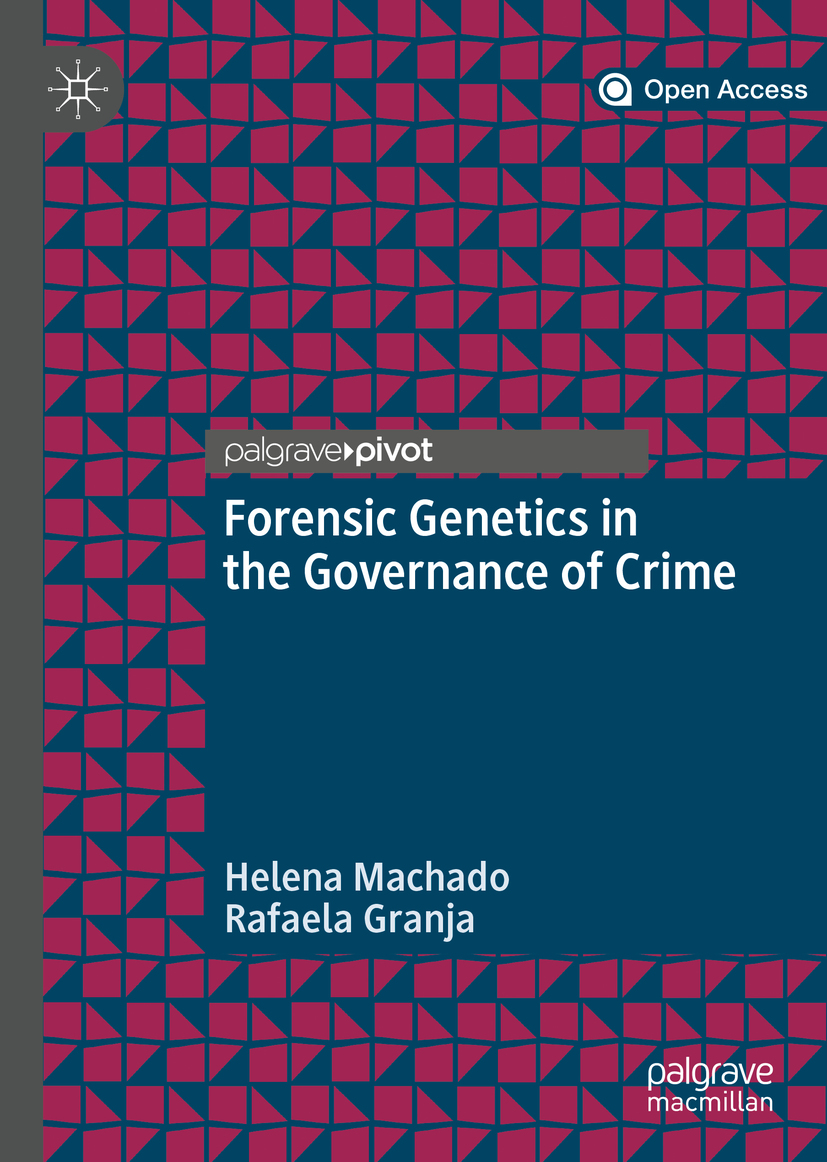


Open AccessThis book is licensed under the terms of the Creative Commons Attribution 4.0 International License (http://creativecommons.org/licenses/by/4.0/), which permits use, sharing, adaptation, distribution and reproduction in any medium or format, as long as you give appropriate credit to the original author(s) and the source, provide a link to the Creative Commons license and indicate if changes were made.
The images or other third party material in this book are included in the book's Creative Commons license, unless indicated otherwise in a credit line to the material. If material is not included in the book's Creative Commons license and your intended use is not permitted by statutory regulation or exceeds the permitted use, you will need to obtain permission directly from the copyright holder.
Cover Pattern: Melisa Hasan
This Palgrave Pivot imprint is published by the registered company Springer Nature Singapore Pte Ltd.
The registered company address is: 152 Beach Road, #21-01/04 Gateway East, Singapore 189721, Singapore
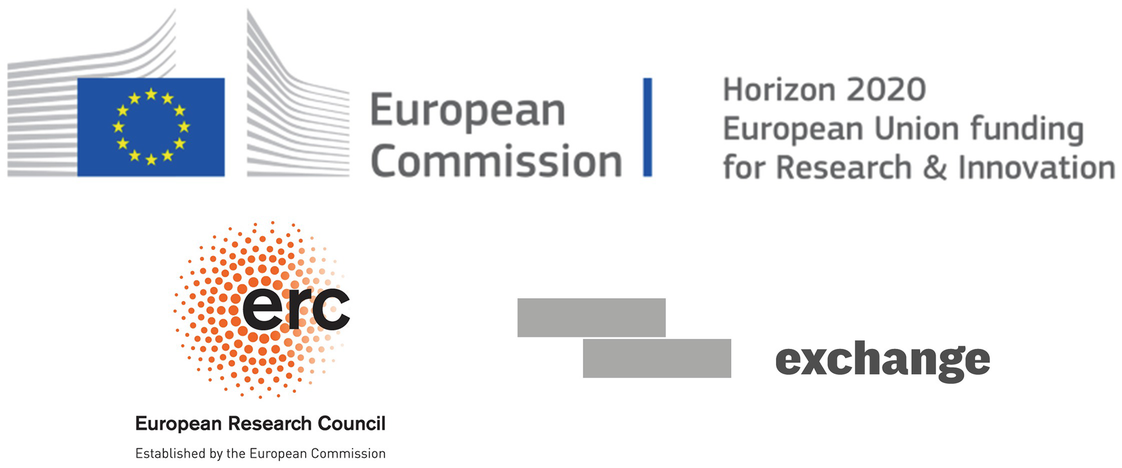
The introductory chapter offers a detailed description of the themes that the reader can expect to find in this book, and a discussion of the social and academic relevance of the role and use of forensic genetic technologies in the criminal justice system. This introductory chapter provides the key concepts for the discussion of how developments in the application of forensic genetics can be understood as part of wider shifts in how the governance of criminality is enacted and made visible through the symbolic power invested in science and technology.
Wherever it goes, the human body leaves traces behind: hair, saliva and other fluids, footprints and so on. Bodys materiality has been a key part of criminal investigations throughout history. The central role of the human body as the basis to identify authors of crimes has gained different shapes in the last 35 years, as forensic science became more commonplace in criminal justice systems.
Forensic science comprises a set of scientific disciplines and methodologies, whose goal is to help police-judicial procedures and activities. Among others, we can mention forensic toxicology, psychiatry and forensic psychology, anthropology and forensic odontology, criminalistics, biology and forensic genetics. This book will pay special attention to the last scientific discipline. Forensic genetics aims to identify with the greatest possible precision the biological origin of a sample, to help the justice system address and solve civil and criminal cases.
One of the most notable aspects of the use of forensic genetics in the field of criminal investigation is the ability to extract DNA profilesa biological structure considered unique for every individualfrom the samples collected at crime scenes or obtained from the bodies of people identified in the criminal investigation (e.g., suspects). This genetic information, if considered relevant by the professionals involved in the specific criminal investigation, may produce genetic evidence, which will subsequently be assessed in a court of criminal justice. This book proposes a sociological approach to the role and place of forensic genetics in the governance of crime in contemporary societies.
The concept governance of crime intends to highlight assumptions, discourses and strategies that shape this social sphere. The governance of crime encapsulates more than the social response to crime. It also incorporates new ways to monitor and control behaviours, as well as reconfigured forms to apply justice, which co-construct new concepts of order and social control (Garland, ). These technological systems do not just act upon individuals, they create growingly elaborate ways, in terms of impact and reach, to monitor and control particular individuals and specific social groups. Finally, this concept also makes it possible to look beyond the way State structures govern current societies, in order to include other social institutions that also constitute the backbone of the governance of crime in contemporary societies. Such is the case of the networks producing scientific knowledge, making visible the symbolic power invested in science and technology. This also extends to non-governmental organizations, private companies, media, civil society and many others.
In current societies, genetics has an aura of objectivity, of being able to produce certainties and truths (Nelkin & Lindee, ). As such, many commentators have emphasized that the presence of genetic technologies such as DNA profiling in policing and as forensic evidence in courts can improve the efficiency of the criminal justice system.
Font size:
Interval:
Bookmark:
Similar books «Forensic Genetics in the Governance of Crime»
Look at similar books to Forensic Genetics in the Governance of Crime. We have selected literature similar in name and meaning in the hope of providing readers with more options to find new, interesting, not yet read works.
Discussion, reviews of the book Forensic Genetics in the Governance of Crime and just readers' own opinions. Leave your comments, write what you think about the work, its meaning or the main characters. Specify what exactly you liked and what you didn't like, and why you think so.

